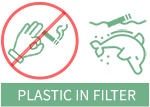Sustainability
Why paper filters?
Around 98 percent of cigarette filters are made of cellulose acetate (CA), a polymer that degrades in the environment very slowly. The time it takes a CA cigarette filter to disintegrate could be count in years, depending on the conditions of the environment in which it has been discarded.
Cigarette butt litter is a major problem at our beaches, in the ocean and throughout the watershed. Birds and sea mammals ingest these toxic butts, misinterpreting them for food.
The paper filter reduce the environmental burden caused by the cigarette butts. They are made of paper which is made of cellulose fibres. Pure cellulose without additives is a polymer – an organic compound belonging to the group of polysaccharides (carbohydrates), one of the most common substances in nature, it is the main building component of plant mass. It is fully biodegradable and, more important, it decomposes into simple and non-toxic compounds: water and carbon dioxide. It is also worth to mention that plant cellulose fibres are both easy to recycle and renewable raw materials. Unlike fossil resources such as coal or oil, they are still produced in the natural life cycle of the plant world.
Single Use Plastic EU Directive

Directive (EU) 2019/904 of the European Parliament of 5 June 2019, commonly known as SUP (Single Use Plastics) Directive, introduced significant restrictions in European Union countries related to the use of plastics for the production of single-use products. This act was a response not only to the alarmingly growing environmental pollution but also to the growing group of consumers who pay more and more attention to a healthy lifestyle, which is expressed, among others, by also by consciously striving to reduce one’s own negative impact on the environment.
With regard to tobacco, cigarette butts are among the 10 single-use plastic products most often found on Europe’s beaches and seas. Together, these products constitute 70 percent of all marine litter items. The new regulations assume consumption reduction targets of tobacco product filters of 50 percent by 2025 and of 80 percent by 2030 in the original draft directive.
In the EU the SUP Directive mandates that, by the second quarter of 2021, all packs with cigarettes made with mono acetate filters will have to contain information on the harmful effects on environment. Paper filters are a good alternative. They are fully biodegradable and available in a variety of specifications, offering a great consumer experience.
